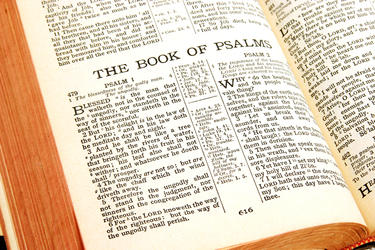Wednesday, October 17, 2012
Why Jesus Wept
The shortest verse in the Bible is John 11:35: “Jesus wept.” But for all its grammatical simplicity, it’s packed with unfathomable complexity.
Jesus wept after speaking with Lazarus’ grieving sisters, Martha and Mary, and seeing all the mourners. That seems natural enough.
Except that Jesus had come to Bethany to raise Lazarus from the dead. He knew that in a few short minutes all this weeping would turn to astonished joy, and then tearful laughter, and then worship.
So one would think that Jesus would be a confident, joyful calm in that storm of sorrow. But he was “greatly troubled” (John 11:33) and he wept. Why?
Compassion for the Suffering
One reason is simply the deep compassion that Jesus felt for those who were suffering. It is true that Jesus let Lazarus die. He delayed coming, and he did not speak healing from a distance like he did for the centurion’s servant (Matthew 8:13). His reasons were good and merciful and glorious. But this did not mean Jesus took the suffering it caused lightly. “For he does not willingly afflict or grieve the children of men” (Lamentations 3:33). Even though Jesus always chooses what will ultimately bring his Father the most glory (John 11:4)—and sometimes, as in Lazarus’ case, it requires affliction and grief—he does not take delight in the affliction and grief itself. No, Jesus is sympathetic (Hebrews 4:15). And as “the image of the invisible God” (Colossians 1:15), in Jesus at the tomb of Lazarus we get a glimpse of how the Father feels over the affliction and grief his children experience.
Sunday, October 14, 2012
Friday, October 12, 2012
Vantage Point: Biblical Marriage & Prayer
In the words of Sir Winston Churchill: "Where does the family start? It starts with a young man falling in love with a girl—no superior alternative has yet been found."

Source: iStockphoto
Has marriage got a prayer? Not a rhetorical question in 2012!
Today Bible-defined marriage—and therefore family—suffers a greater attack than at any time in at least America's history. As I write this, traditional marriage has just been catapulted into a gigantic campaign issue in this year's U.S. presidential election.
Bible prophecy has always foretold divine punishment for America or any nation persisting in sexual immorality, especially at an institutional level. While gay marriage is considered by many to be a political issue, it is much broader—being in fact a moral andspiritual uissue. Sadly, its rise was only to be expected given society's plummet into godless thinking.
Ultimately, everything in human life comes down to two great questions: Does God exist? And do you believe in God and believe God?
“THE BIBLICAL VIEW OF HOMOSEXUALITY”
(This article was originally printed in January, 2008)
“For this cause God gave them up unto vile affections: for even their women did change the natural use into that which is against nature: And likewise also the men, leaving the natural use of the woman, burned in their lust one toward another; men with men working that which is unseemly, and receiving in themselves that recompence of their error which was meet” (Rom . 1:26-27).
After reading a vast variety of emails, articles, news clips, etc., I feel strongly impressed by the Holy Spirit to address the very delicate and controversial issue of homosexuality, not only homosexuality as society knows it to be, but God’s Biblical standard concerning it. I do not wish to speak from standards of my own making here nor the ethical standards of our modern culture, but from the standards of a Holy God who has asked me to reach out to all who will hear Him concerning this very critical issue of our time. I hope to make it clear to you how the Lord feels about homosexuality and, as well, his Solution for this terrible sin .
I once heard a wise man say that while God is the greatest embodiment of Love which has ever existed or will ever exist, it is not love that makes Him God .
God is God because of His Power! He is God because of His Authority! He is All-Powerful, All-Mighty, and All-Knowing. Yes, God is Love, but love is not God.
The Love of god is holy. This presents a problem for a fallen, sinful creation. Mankind cannot receive the Love of God without willingly submitting to His Order and Authority by the Way of the Cross . The Sacrifice of His Son, Jesus, for the Redemption of our sins was God’s way of showing us that within His great Power was also great Love . But, the conditions inherent in this Way of the Cross must be met for a man to receive the Love of God on a personal basis — to receive Salvation . We must make Jesus both our Savior and our Lord . Therefore, the Way of the Cross requires a man to surrender lordship of his own life to God, and he must also agree with God that it is His Standards alone which constitute Holiness .
Thursday, October 11, 2012
Point of Wisdom: Pray With a Psalm in Your Heart
It can sometimes be hard to know what to talk about with God in prayer. Some Scripture-based counsel to a struggling individual can help you too.

Source: Photos.com
He described himself to the pastor and me as a former hippie who had been off the drugs for several years. But he and his wife explained that the hallucinogens' effects were still badly slowing his mental processes. We could see that from our conversation.
My part was as a ministerial trainee participating in this pastoral visit with a young couple who had lived hard and wild during the hippie movement years of the 1960s. The man now loaded freight on ships in the Thames River near London. He had muscles for the work but wished that he still had the muscle in his mind.
She had many questions about the Bible and God's way, but one main question plagued his thoughts: " How do I pray? I can't think of much to say. " There were tears in his eyes. He really, truly wanted to know how to talk to God.
No Halfway Covenant
article by Frank Dunkle
If your parents are true Christians, does that make you one? Or is more required of you? This was an important question for the Puritans of early America. And it remains an important issue today.

Source: George Henry Boughton, Pilgrims Going to Church, 1867
Are you a true Christian? Do you need to join a church to be one? Does your parents' relationship with God make a difference in your own relationship with Him?
To explore this, let's first consider an interesting piece of early American history. In the mid-1600s, several ministers in New England held a special conference to discuss youth and the church. They developed a doctrine called the "Half-Way Covenant." We'll briefly examine this concept in addressing a vital issue for today.
Just what makes a person a true Christian? Are the children of true Christians automatically true Christians also—or is more required?
Puritans purify
To understand the Half-Way Covenant and why it matters to us, we need to know something about the Puritans. As Protestants in England, they were pleased that King Henry VIII had effectively separated England from the Roman Catholic Church in the 1500s. However, they believed that neither the king nor the Church of England did enough to remove unbiblical practices from their worship. They wanted to purify the church, which is why they were called "Puritans."
Some Puritans thought they needed to separate altogether from the religious authorities of England and the rest of Europe, so they came to America to settle New England. They were determined to study the Bible and to obey it fully. (Those who settled Plymouth Colony in 1620 were Separatists who later became known as the Pilgrims. The Puritans who arrived the next decade to found the Massachusetts Bay Colony and other settlements were not initially as inclined to Separatism, but they eventually moved in that direction.)
Subscribe to:
Posts (Atom)
An Academic Critique of Internal Contradictions in the Quran with Reference to Eschatological Descriptions of Hell’s Sustenance
Title: An Academic Critique of Internal Contradictions in the Quran with Reference to Eschatological Descriptions of Hell’s Sustenance Au...
TRENDING NOW
-
Baba umenipa funguo muhimu katika Mathayo 16:19 za kufunga na kufungua. Ninatumia funguo hizo kufunga na kufungua, kuvunja na kubamiza kil...
-
Kuna watu wanapitia mateso mengi sana, wengine wamefungwa katika vifungo bila wao kujijuwa basi chukua muongozo huu utakusaidia au itasaid...
-
Adui anakuja kuiba, kuua na kuharibu kila kitu chetu, ni lazima kuwa tayari kupambana na maadui, tujue silaha zetu, na kutumia neno la Mun...
-
Twakusalimu kwa mara ingine katika jina tukufu na takatifu la Yesu Kristo Bwana wetu. Twazidi pia kukushukuru kwa ajili ...
